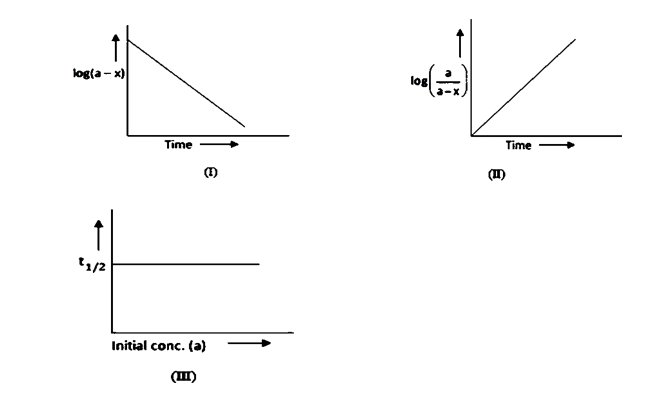A first order reaction is carried out with an initial concentration of 10 moles per litre and 75 % of the reactant changing to the product if t 50% is 20 min.
40
80
160
cannot be calculated
The correct Answer is:B
To solve the problem, we need to determine the time required for 75% of the reactant to convert into the product in a first-order reaction. We know the following:
- Initial concentration ((A)0) = 10 moles per liter
- 75% of the reactant changes to product
- Half-life (t1/2) = 20 minutes
1. Understanding the Reaction Completion:
- If 75% of the reactant has reacted, then 25% of the reactant remains.
- This means that the concentration of the reactant after 75% conversion is:
(A)=(A)0×(1−0.75)=10moles/liter×0.25=2.5moles/liter
2. Using the First-Order Kinetics Equation:
- The first-order kinetics can be described by the equation:
k=0.693t1/2
- Substituting the half-life into the equation:
k=0.69320min=0.03465min−1
3. Applying the Integrated Rate Law:
- The integrated rate law for a first-order reaction is given by:
ln((A)0(A))=kt
- Substituting the known values:
ln(10moles/liter2.5moles/liter)=0.03465min−1×t
4. Calculating the Natural Logarithm:
- Calculate the left-hand side:
ln(4)=1.3863
- Therefore, we have:
1.3863=0.03465t
5. Solving for Time (t):
- Rearranging the equation to solve for t:
t=1.38630.03465≈40minutes
Final Answer:
The time required for 75% of the reactant to convert into product is approximately 40 minutes.
- 75% of the reactant changes to product
- Half-life (t1/2) = 20 minutes
- If 75% of the reactant has reacted, then 25% of the reactant remains.
- This means that the concentration of the reactant after 75% conversion is:
(A)=(A)0×(1−0.75)=10moles/liter×0.25=2.5moles/liter
- The first-order kinetics can be described by the equation:
k=0.693t1/2
- Substituting the half-life into the equation:
k=0.69320min=0.03465min−1
- The integrated rate law for a first-order reaction is given by:
ln((A)0(A))=kt
- Substituting the known values:
ln(10moles/liter2.5moles/liter)=0.03465min−1×t
- Calculate the left-hand side:
ln(4)=1.3863
- Therefore, we have:
1.3863=0.03465t
- Rearranging the equation to solve for t:
t=1.38630.03465≈40minutes
The time required for 75% of the reactant to convert into product is approximately 40 minutes.
Topper's Solved these Questions
- CHEMICAL KINETICSBOOK - RC MUKHERJEECHAPTER - CHEMICAL KINETICSEXERCISE - PROBLEMS
42 Videos
- CHEMICAL EQUIVALENCEBOOK - RC MUKHERJEECHAPTER - CHEMICAL EQUIVALENCEEXERCISE - PROBLEMS
24 Videos
- CHEMICAL THERMODYNAMICSBOOK - RC MUKHERJEECHAPTER - CHEMICAL THERMODYNAMICSEXERCISE - Objective problems
58 Videos
Similar Questions
A first order reaction is 20% complete in 10 minutes. Calculate the time for the completion of 75% of the reaction.
View SolutionWhich of the following is/are correct for the first order reaction ? (a is initial concentration of reactant, x is concentration of the reactant reacted and t is time)

View Solution
Knowledge Check
A first order reaction is carried out with an initial concentration of 10 moles per litre and 75 % of the reactant changing to the product if t 50% is 20 min.
A40B80C160Dcannot be calculatedA first order reaction is carried out with an initial concentration of 10 mol litre and 80% of the reactant changes into product in 10sec. Now if the same reaction is carried out with an intial concentration of 5 mol per litre the percentage of the reactant changing to the product in 10 sec is:
A40B80C60D50k for a zero order reaction is 2×10−2 mol . L−1s−1 . If the concentration of the reactant changed into the product .Now if the same reaction is carried out with an initial concentration of 5 moles per litre . The percentage of the reactant changing to the product is .
A0.5 MB1.25 MC12.5 MD1.0 M
A first order reaction is carried out with an initial concentration of 10ML−1 and 80% of the reactant changes into the product. Now if the same reaction is carried out with an initial concentration of 5ML−1, the percentage of reactant changing into the product. Now if the same reaction is carried out with an initial concentration of 5ML−1, the percentage of reactant changing to the product is
View SolutionA first order reaction is carried out starting with 10 mol L−1 of the reactant. It is 40% complete in one hour. If the same reaction is carried out with an initial concentration of 5 mol L−1, the percentage of the reaction that is completed in one hour will be
View SolutionThe specific rate constant for a first order reaction is 1×10–3sec–1. If the initial concentration of the reactant is 0.1 mole per litre the rate (in mol l−1sec−1) is:
View SolutionA first order reaction is 50% complete in 10 minutes The rate constant of the reaction is
View SolutionThe half-life of a first order reaction is 30 min and the initial concentration of the reactant is 0.1 M. If the initial concentration of reactant is doubled, then the half-life of the reaction will be
View Solution
